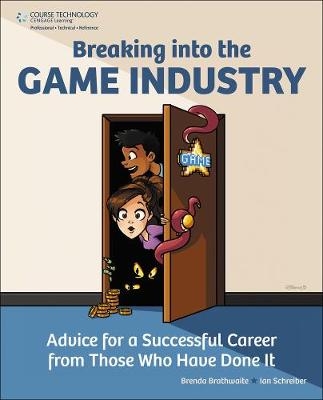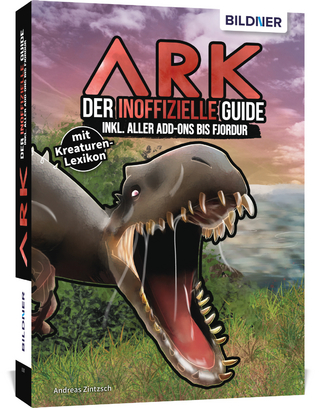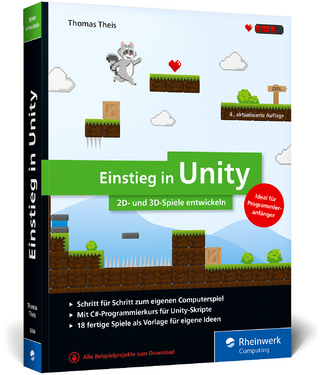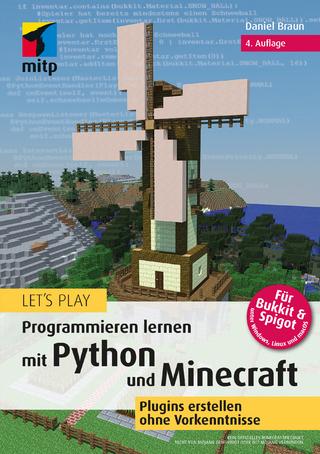
Breaking Into the Game Industry
Delmar Cengage Learning (Verlag)
978-1-4354-5804-8 (ISBN)
- Keine Verlagsinformationen verfügbar
- Artikel merken
Aspiring and professional game developers have a lot of questions: What should be in their portfolios? How do they make contacts? How do they negotiate salaries? How much do game designers make? What should they wear to interviews? In this fast-paced and humorous guide, the authors answer these questions and many more, including the ones you didn’t know to ask. BREAKING INTO THE GAME INDUSTRY: ADVICE FOR A SUCCESSFUL CAREER FROM THOSE WHO HAVE DONE IT, provides aspiring game developers the know-how and confidence they need to make it in the industry. Written in a unique and engaging question and answer format, the book presents a clear, overall sense of what the game industry is and how the professionals operate in it, answering the key questions new developers should be asking as they begin their career. Providing invaluable advice and tips from experienced professionals, you’ll learn how to best present yourself and your skills, showcase your work and create a compelling portfolio, and much more, giving you a leg up as you try to break into the competitive and fast-paced game industry.
Ian Schreiber has been in the industry for eight years, first as a programmer and then as a game designer. He has worked on five published game titles, including Playboy: the Mansion and the Nintendo DS version of Marvel Trading Card Game. He has also developed training/simulation games for two Fortune 500 companies. Ian has taught game design and development courses at Ohio University, Columbus State Community College, and Savannah College of Art and Design, and has mentored college students at those and several other universities. Ian is co-author of Challenges for Game Designers."" Brenda Brathwaite is an award-winning game designer, artist, writer, and creative director with 30 years of experience in the industry. Before founding Loot Drop, Brenda worked for a variety of game companies including Atari, Electronic Arts, Sir-tech Software, and numerous companies in the social games space. She has worked on many Facebook games, including Cloudforest Expedition, Ravenwood Fair, Critter Island, SuperPoke Pets!, SPP Ranch, Garden Life, Rock Riot, and Top Fish. Brenda served on the board of the International Game Developers Association (IGDA) and presently chairs the IGDA’s Women in Games Special Interest group. Brenda was named Woman of the Year by Charisma+2 Magazine in 2010 and also was a nominee in Microsoft’s 2010 Women in Games game design awards. In 2009, her game Train won the coveted Vanguard Award at IndieCade. She was named one of the top 20 most influential women in the game industry by Gamasutra.com in 2008 and one of the 100 most influential women in the game industry by Next Generation magazine in 2007. Nerve magazine also called her one of the 50 artists, actors, authors, activists, and icons who are making the world a more stimulating place.
1. Why Are You Doing This? What's This Book About, and Why Are You Writing It?
2. How Should I Choose a School?
3. What Percentage of My School Work Will Help Me Get a Job?
4. Lots of Stuff I Learn in School Seems Like It Has Nothing to Do with Actually Making Games for a Living What Classes Did You Take that Were the Most Useful on the Job?
5. How Much Weight Do Studios Put on GPAs?
6. How Much Weight Do Studios Put on the Major or College Attended?
7. Why Should I Care About Video Game History?
8. Is a Graduate Degree (Such as an MFA or Ph.D.) Useful for Getting a Job in the Game Industry?
9. I Want to be a Programmer in the Game Industry. People Are Suggesting I Shouldn't Bother with More Complex Languages like C or C++ and Focus Instead on Languages Like ActionScript (Flash). Is that a Valid Path?
10. Is Getting an Undergraduate Degree a Waste of Time if I Want a Job in the Game Industry?
11. Is It Important to Play Games as a Student?
12. If You Could Add Something to a Student with Great Vision, What Would It Be?
13. I Want to be a Game Designer. Do I Need to Learn Programming or Computer Science?
14. Is It Better to be a Specialist or Generalist, in the Short Term or Long Term?
15. Is There Another Way to Get Up to Speed on Game Development, Other than Making Games?
16. What's the Best Subject to Make a Game About?
17. Where Do You Get Your Ideas?
18. How Do I Get My Games to be More Fun and Not Just Tasks?
19. How Do I Make Contacts in the Game Industry?
20. It Costs How Much to go to GDC? How Will I Ever Afford That?
21. Should I Get My Own Business Cards? What Should Be on Them? What Do I Do with Them?
22. When Should I Start Networking?
23. How Do I Get Game Developers' Business Cards?
24. When Should I Follow Up After Getting Someone's Business Card?
25. Is There Anything I Shouldn't Do When Following Up?
26. Should I Ask Developers to Review My Portfolio?
27. I Heard that a Lot of People in the Game Industry Use Social Media (Twitter, Facebook, and so on). Why?
28. What Else Shouldn't I Do When Communicating with Developers?
29. If I Change My Last Name (such as for Marriage) in Mid-Career, Does that Affect My Career by Messing with the Credits of Previously Shipped Games?
30. What Should the Front Page of My Portfolio Look Like?
31. As an Artist, What Are Some General Portfolio Guidelines I Need to Follow?
32. What Do Character Artists Need to Show in Their Portfolios?
33. What Do Environment Artists Need to Show in Their Portfolios?
34. What Do Modelers Need to Show in Their Portfolios?
35. What Do Texture Artists Need to Show in Their Portfolios?
36. What Do Concept Artists Need to Show in Their Portfolios?
37. What Do Game Designers Need to Show in Their Portfolios?
38. What Do Game Writers Need to Show in Their Portfolios?
39. What Do Level Designers Need to Show in Their Portfolios?
40. What Do Programmers Need to Show in Their Portfolios?
41. What Should a Producer/Project Manager (or Someone Aspiring to be One) Have in Their Portfolio?
42. What Do Sound Designers Need to Show in Their Portfolios?
43. Are There People Who Don't Need Portfolios?
44. How Many Images/Games Should I Have in My Portfolio?
45. When Should I Start Working on My Portfolio?
46. Have You Seen any Stupid Portfolio Tricks?
47. How Do I Get My Work Out There So Someone Can See It?
48. Wait, Doesn't Everyone Say that It's Impossible to be Hired as a Game Designer or Game Writer Straight Out of College, or as Your First Job in the Industry?
49. How Much Help will Reading About Game Development be in Obtaining a Job in the Game Industry?
50. How Much Experience Should I Have Before I Start Looking for a Job as a Game Designer?
51. I Talked to a Woman and She Was Really Excited Because She Heard I Was a [Insert Desired Position Here]. She Wanted to Talk with Me and See My Portfolio. That's Great, Right?
52. What's the Best Approach for Getting an Internship?
53. Where Should I Look for Jobs?
54. Should I Just Show Up Unannounced at a Game Company?
55. Does the Current State of the Economy Have an Effect on Game Development or Hiring?
56. How Do I Write a Good Cover Letter that Connects with HR and Developers?
57. How Do I Write a Good Résumé that Connects with HR and Developers?
58. They're Giving Me an Art/Design/Programming Test. What Is It and Why Are They Doing This?
59. The Design/Programming/Art Test Asks Me to Come Up with Some Game/Code/Art Ideas. I Don't Want Them to Steal My Ideas! What Should I Do?
60. Should I Try to Take a Coding Test Before I am Solid in the Language?
61. How Early Should I Show Up for an Interview?
62. How Should I Dress for an Interview?
63. What Happens in an Interview? How Do I Handle It?
64. They Just Offered Me a Salary! How Do I Know If It's Good? Should I Negotiate?
65. Do Interviewees Ever Say Dumb Things?
66. Do People Still Expect Me to Follow Up After an Interview?
67. What Should I Do Before I Accept a Job Offer?
68. They Want Me to Sign a Non-Compete. What's That?
69. They Want Me to Sign an NDA. What's That?
70. How Do I Find a Place to Live if I'm Hired in a New City?
71. Is There Such a Thing as Taking a New Job Too Early?
72. How Will I Feel My First Day On the Job?
73. Once I Have a Job, Any Key Pointers?
74. What Do Entry-Level Employees Typically Do in Their First Few Months?
75. If I Enter in the Middle of a Project, What's the Best Way to Get Up to Speed?
76. If I Join a Game Company, Will They Make My Game Idea?
77. How Is Performance Measured for Raises, Bonuses, and Promotions?
78. What Is It Like to Work on a Big Licensed Title?
79. What's It Like to Work at a Small Studio on a Series of Small Projects?
80. What Is the Scariest Thing About Being a Game Designer?
81. What's the Worst Thing You've Seen in a Game Development Meeting?
82. Will I Really Work 70 Hours a Week?
83. What Should I Do If I Hate My Job? (Or: How To Exit a Company Gracefully)
84. What Should I Do If I Hate Someone I Work With?
85. What Should I Do If I Totally Disagree with Someone?
86. What Is the Game Industry"?
87. Is There a Way to Get a Feel for the Industry Before Even Getting There?
88. Is the Game Industry a Good Place to Meet Someone to Date?
89. What Does a Game Developer Do?
90. What Does a Lead Do?
91. Who Is the Most Evil Person on a Game Development Team?
92. Have You Seen Someone Make It in the Industry with a Physical or Mental Disability?
93. How Much Money Will I Make Working in the Game Industry?
94. Do Small Studios Typically Have Health, Dental, and Savings Plans?
95. Which Programming Language Is Used the Most?
96. What Is It Like to Be a Woman in the Game Industry?
97. What's It Like to Be a Minority in the Game Industry? Is Diversity Important?
98. What's It Like Working as an LGBT in the Game Industry?
99. I Want to Send My Idea to a Game Company. How Do I Do This?
100. Is There Such a Thing as a Stupid Question?
Index."
| Verlagsort | Clifton Park |
|---|---|
| Sprache | englisch |
| Maße | 185 x 234 mm |
| Gewicht | 606 g |
| Themenwelt | Sachbuch/Ratgeber ► Beruf / Finanzen / Recht / Wirtschaft ► Bewerbung / Karriere |
| Informatik ► Software Entwicklung ► Spieleprogrammierung | |
| Informatik ► Weitere Themen ► Computerspiele | |
| ISBN-10 | 1-4354-5804-4 / 1435458044 |
| ISBN-13 | 978-1-4354-5804-8 / 9781435458048 |
| Zustand | Neuware |
| Haben Sie eine Frage zum Produkt? |
aus dem Bereich


